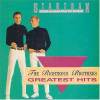小简介
The Righteous Brothers于1963年,由Bobby Hatfield和Bill Medley组成,是一支白人灵魂乐的组合。同年推出首张大碟,次年即以《You’ve Lost That Lovin’ Feeling》红遍乐坛,而《Unchained Melody》则将二人的事业推上高峰。《You’ve Lost That Lovin’ Feeling》被“靓佬汤”(汤姆克鲁斯)主演的《Top Gun》(冲上云宵)中经常哼唱,更创下全美电台播放次数超过八百万次的惊人纪录!
The Righteous Brothers于1968年暂时解散,成员之一的Bill Medley先是暂别歌坛休息,后来在1980年代重新以个人歌手的身份回到歌坛。期间,Bobby Hatfield则继续与另一位歌手Jimmy Walker 以The Righteous Brothers的组合名义演唱。1980年代中期之后,Bill Medley与Bobby Hatfield再度重组,直到Bobby Hatfield于2003年去世为止。而在Bobby Hatfield去世前,Billy Joel引荐The Righteous Brothers进入摇滚名人殿堂之列,总算是让Bobby Hatfield了却了一桩心愿。
They werent brothers, but Bill Medley and Bobby Hatfield (both born in 1940) were most definitely righteous, defining (and perhaps even inspiring) the term blue-eyed soul in the mid-60s. The white Southern California duo were an established journeyman doo wop/R&B act before an association with Phil Spector produced one of the most memorable hits of the 1960s, Youve Lost That Lovin Feelin. The collaboration soon fell apart, though, and while the singers had some other excellent hit singles in a similar style, they proved unable to sustain their momentum after just a year or two at the top.
When Medley and Hatfield combined forces in 1962, they emerged from regional groups the Paramours and the Variations; in fact, they kept the Paramours billing for their first single. By 1963, they were calling themselves the Righteous Brothers, Medley taking the low parts with his smoky baritone, Hatfield taking the higher tenor and falsetto lines. For the next couple of years they did quite a few energetic R&B tunes on the Moonglow label that bore similarity to the gospel/soul/rock style of Ray Charles, copping their greatest success with Little Latin Lupe Lu, which became a garage-band favorite covered by Mitch Ryder, the Kingsmen, and others.
Even on the Moonglow recordings, Bill Medley acted as producer and principal songwriter, but the duo wouldnt break out nationally until they put themselves at the services of Phil Spector. Spector gave the Wall of Sound treatment to Youve Lost That Lovin Feelin, a grandiose ballad penned by himself, Barry Mann, and Cynthia Weil. At nearly four minutes, the song was pushing the limits of what could be played on radio in the mid-60s, and some listeners thought they were hearing a 45 single played at 33 rpm due to Medleys low, blurry lead vocal. No matter; the song had a power that couldnt be denied, and went all the way to number one.
The Righteous Brothers had three more big hits in 1965 on Spectors Philles label (Just Once in My Life, Unchained Melody, and Ebb Tide), all employing similar dense orchestral arrangements and swelling vocal crescendos. Yet the Righteous Brothers-Spector partnership wasnt a smooth one, and by 1966 the duo had left Philles for a lucrative deal with Verve. Medley, already an experienced hand in the producers booth, reclaimed the producers chair, and the Righteous Brothers had another number one hit with their first Verve outing, (Youre My) Soul and Inspiration. Its success must have been a particularly bitter blow for Spector, given that Medley successfully emulated the Wall of Sound orchestral ambience of the Righteous Brothers Philles singles down to the smallest detail, even employing the same Mann-Weil writing team that had contributed to Youve Lost That Lovin Feelin. Its a bit of a mystery as to why the Righteous Brothers never came close to duplicating that success during the rest of their tenure at Verve. But they would only have a couple of other Top 40 hits in the 1960s (He and Go Ahead and Cry, both in 1966), even with the aid of occasional compositions by the formidable Goffin-King team. In 1968 Medley left for a solo career; Hatfield, the less talented of the pair (at least from a songwriting and production standpoint), kept the Righteous Brothers going with Jimmy Walker (who had been in the Knickerbockers).
Medley had a couple of small hits in the late 60s as a solo act, but unsurprisingly neither brother was worth half as much on their own as they were together. In 1974 they reunited and had a number three hit with Rock and Roll Heaven, a tribute to dead rock stars that some found tacky. A couple of smaller hits followed before Medley retired from performing for five years in 1976. The Righteous Brothers continued to tour the oldies circuit off and on in the 1980s and 1990s. It was while on one of these tours that Bobby Hatfield died suddenly on November 5, 2003.



